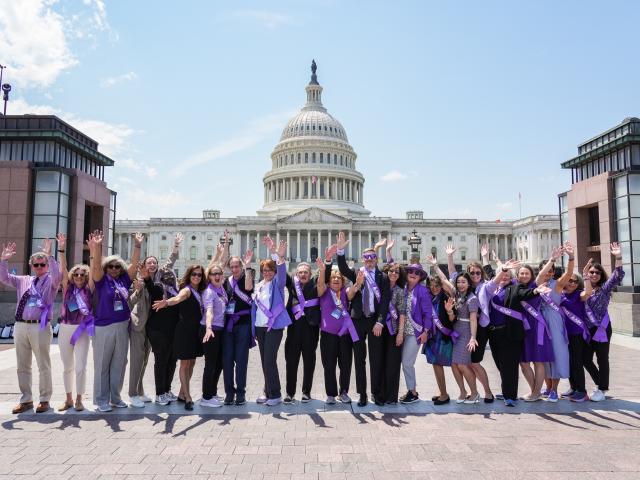WASHINGTON, D.C., January 1, 2019 - The Alzheimer's Association and the Alzheimer's Impact Movement (AIM) are celebrating the passage of the Building Our Largest Dementia (BOLD) Infrastructure for Alzheimer's Act (S. 2076/H.R. 4256). Signed into law today, the bill will enhance and improve our nation's public health response to the Alzheimer's crisis, and further demonstrates that Congress remains fully committed to the fight to end Alzheimer's.
The BOLD Infrastructure for Alzheimer's Act was introduced by Senators Susan Collins (R-Maine), Catherine Cortez Masto (D-Nev.), Shelley Moore Capito (R-W.Va.), Tim Kaine (D-Va.), and by Representatives Brett Guthrie (R-Ky.), Paul Tonko (D-N.Y.), Chris Smith (R-N.J.) and Maxine Waters (D-Calif.). Developed in close partnership between the sponsors, the Alzheimer's Association and AIM, the bill quickly developed enormous bipartisan support. More than half of the 115th Congress - 58 Senators and 256 Representatives - cosponsored the bill. The bill unanimously passed in the Senate on December 12 and passed in the House 361-3 on December 19
"The passage of the BOLD Infrastructure for Alzheimer's Act is an important step to address the growing Alzheimer's public health crisis," said Harry Johns, Alzheimer's Association and AIM President and CEO. "We are thankful to the bill's bipartisan sponsors for their continued dedication and work to implement policies to improve the lives of all of those impacted by this devastating disease."
The BOLD Infrastructure for Alzheimer's Act will establish Alzheimer's Centers of Excellence in communities around the country to expand and promote effective Alzheimer's interventions, and issue funding to state and local public health departments to promote cognitive health, risk reduction, early detection and diagnosis, and the needs of caregivers. Critically, the BOLD Infrastructure for Alzheimer's Act will also increase collection, analysis and timely reporting of data on cognitive decline and caregiving to inform future public health actions.
Today more than 5 million Americans are living with the disease and by 2050 this number is projected to rise to nearly 14 million. Alzheimer's is the most expensive disease in the country, costing an estimated $277 billion - including $186 billion in direct costs to Medicare and Medicaid - in 2018.
"Today is an historic day for the millions of families affected by Alzheimer's disease now that the BOLD Infrastructure for Alzheimer's Act has been signed in to law," said Alzheimer's Association Chief Public Policy Officer, Robert Egge. "Thanks to all the elected officials who championed this legislation, the country will now be better able to fight this devastating disease as we continue to work towards our vision of a world without Alzheimer's."
In 2005, the Alzheimer's Association and the Centers for Disease Control and Prevention (CDC) partnered to create and launch the Healthy Brain Initiative (HBI) and developed the Public Health Road Map. The HBI Road Map includes actions for state and local public health departments to promote cognitive functioning, address cognitive impairment and help meet the needs of caregivers. The passage of the BOLD Infrastructure for Alzheimer's Act will increase implementation of the HBI Road Map nationwide.
Alzheimer's Association ®
The Alzheimer's Association is the leading voluntary health organization in Alzheimer's care, support and research. Our mission is to eliminate Alzheimer's disease through the advancement of research; to provide and enhance care and support for all affected; and to reduce the risk of dementia through the promotion of brain health. Our vision is a world without Alzheimer's. For more information, visit alz.org.
